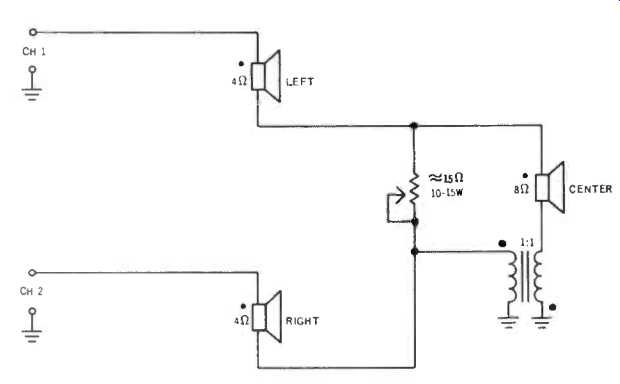Third Channel Blender
Dear Sir:
I have just read "How Many Channels?" in the November issue. In this same issue, on page 14, you printed my letter and circuit on a derived center speaker. After reading about triphonic stereo, I now wonder if I haven't been getting something similar with my circuit. Mine is very similar to the Dynaco system except that it does not require "digging into" the amplifier and adding the so-called "blend" resistor. Since most people will be reluctant to modify a $500 receiver, I suggest the following circuit.
Please note that another speaker may be substituted for the resistance. You then will have a four-speaker system similar to the Dynaco. Also, the improved version (three speaker) includes a pot so that any degree of blend or anti-blend may be obtained.
If you want a normal derived-center speaker sound--with all the speakers along one wall--you simply adjust for a null in the cross channel leakage. Turn the amplifier balance control all the way in one direction and adjust the pot for minimum volume in the speaker with the reduced signal. If you want triphonic stereo-with the speakers arranged in a triangle-you would adjust the pot for somewhat more resistance.
For those who cannot find an Electro-Voice transformer, you may use a Microtran HM-90, but the distortion may be higher at high-power levels. Use the leads marked + 16 and -16. Ground the lead marked zero. You should make every effort to obtain the Electro-Voice XT-1, as it is far superior.
-Clyde E. Wade, Jr., 312 E. Cedar Little Rock, Ark. 72205

Fig. 1--The transformer must be phased as shown in the diagram or the resistor
will not cancel channel leakage.
Off-Center Records
Dear Sirs,
Regarding the controversy about off center records, those of us who prefer "classical music" may as well face it, we are not going to get any improvement in quality.
As long as record manufacturers can turn out and sell "today's music" at the current rate and get no kick-backs from the kids, they could care less about the serious music market.
Off-center pressings don't hurt the sound of music that is purposely distorted before recording. Possibly, it even helps it, I don't know.
Where a long clarinet or piano passage can hurt the beauty of Debussy's music, if the tonearm weaves back and forth as much as 36 of an inch, it might add to the cacophony created by Blood, Sweat and Tears, and the kids just don't care.
Yours truly,
Thomas Coane 55 Curtis Ave., Wallingford, Conn. 06492
McIntosh
Dear Sir:
Some months ago I received the September issue of your magazine listing products of the different companies involved in selling consumer hi fi products.
I noticed in the issue that no products of the McIntosh Company were listed. I also noticed in a later issue, which included some additions to the earlier listing, that again no McIntosh products were listed. Was there some reason for the omission of McIntosh products? Do you plan to test any McIntosh products in the foreseeable future?
-Andrew R. Agee, M.D., Minneapolis, Minn.
McIntosh did not wish to be listed in our annual directory. While there are several McIntosh products we would like to test, we are not presently engaged in testing any of them.
-Ed.
Eccentric Spindle
Dear Sir:
I quite agree with your comment on my letter concerning off-center phonograph records, which you were kind enough to publish in the October issue, that the problem lies with the record manufacturers, except on one point.
My closing suggestion that someone produce a turntable with an adjustable eccentric spindle was intended partly to be humorous, but only partly, for if the record manufacturers began making only perfectly-centered records tomorrow, many of us would still be left with a lot of cherished performances with sound unsteady in pitch.
J. D. Reed, 5467 S. Cornell Ave., Chicago, Ill. 60615
Technical Articles
Dear Sir:
In the November issue Dear Editor column, reader P. Kelley complained of an article being "too technical." As a tyro I found the most mundane test report incomprehensible at first. With much interest and considerable time, even the most comprehensive test reports leave something to be desired. It is only those difficult technical articles that expand our knowledge of high fidelity. Please don't reduce your magazine to the run-of-the-mill ad copy types.
-A. D. Ewart Vancouver, B.C., Canada.
(Source: Audio magazine.)
= = = =